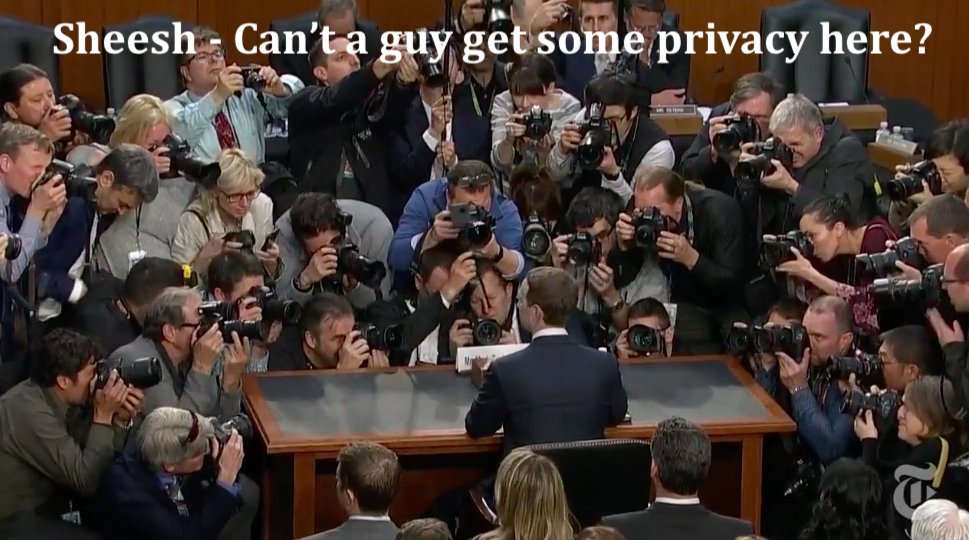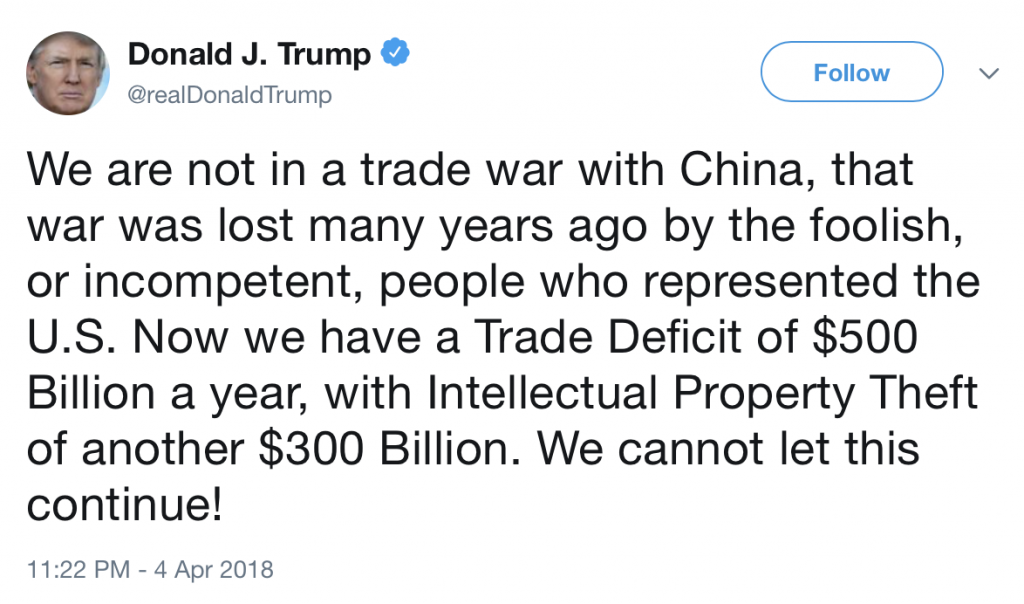
It’s ironic that while the boy child in charge of the world’s largest surveillance program feigns concern and those in charge feign outrage, the theft of intellectual property is being used as a weapon by the US government against China.
As to Zuckerberg… Well, he hasn’t (to our knowledge) done this with state information, just yours. And so don’t expect anything to come of this because it’s likely just theatre. I expect it to look very Corzine-like: a slap on the wrist and a promise to be a good boy should do the trick.
hypocrite [hip-uh-krit]
noun
- a person who pretends to have virtues, moral or religious beliefs, principles, etc., that he or she does not actually possess, especially a person whose actions belie stated beliefs.
- a person who feigns some desirable or publicly approved attitude, especially one whose private life, opinions, or statements belie his or her public statements.
It may well hurt Facebook shareholders, but the FANGs are a bug in search of a windshield anyway.
Let me ask you a question…
Let’s imagine Facebook was a Chinese or Russian company that had collected (as Facebook has) data from users worldwide, and Zuck or his Chinese or Russian alter ego was sitting in front of men in suits with stern faces in the halls of power of either Beijing or Moscow.
Tell me, what do you think the US government would be doing and saying?
While you’re pondering that let’s move on…
Trade? Ignorant
Chairman Trump, whose ego is only surpassed by his ignorance, now wants to go all Liam Neeson on China for stealing “our” intellectual property. Something boy child above has been doing willy nilly for yonks and selling it to boot.
As is always, the case with a media-fed populace who find critical thinking more difficult than patting their stomach and rubbing their head at the same time, it’s disturbingly popular.

When Trump was elected I’ll admit to having had a little burst of joy and not only because I promised it was going to happen (ego never serves an investor), but because the basilisk was defeated, and oh Lord, was that wonderful to see.
And therein lay the problem.
Let’s face it… American’s really had no choice — between a crook and a jerk, the former with a known agenda and the latter unpredictable at best.
Now, well into the Trump presidency, the risk of an actual shooting war with China has never been so high.
Trade wars impact economies in myriad ways more complex than you’d imagine, creating tensions and feedback loops which morph into something that not one in a million would have envisaged.
[clickToTweet tweet=”Trade wars impact economies in myriad complex ways, creating tensions and feedback loops, which morph into something that not 1 in a million would have envisaged.” quote=”Trade wars impact economies in myriad complex ways, creating tensions and feedback loops, which morph into something that not 1 in a million would have envisaged.”]
In short, it’s as unpredictable as a menopausal, bipolar, sleep deprived, drug addicted Paris Hilton going through cold turkey at rehab.
The economy isn’t a plumbing system — easily understood and easily fixed.
That is, of course, what many ivory tower economists would have you think, despite their disastrous results. Like a moth to a flame they go back for more. Like far too many things coming out of academia it’s as wrong as a Michael Moore in a leopard skin thong.
Think about it like this…
The US runs a trade deficit. Which is to say its net exports are negative. And so the simpleton response, one acceptable from a 5 year old, is that the US needs to curtail imports as this will boost growth.
I know, I know… silly but that’s how the thinking goes. Problem is we’re not dealing with a snotty little 5-year old but a legion of idiots who actually think this way.
Here’s a quick example of how silly this proposition is… and how the plumbing can’t be fixed with a simple tweak.
The US spends about $180 billion each year on energy imports.
Based on Trump’s thinking, that the trade deficit needs to be reduced, the US should simply stop importing this energy.
Bam! $180 billion of the deficit would be eliminated. Or put another way, GDP would rise by $180 billion. Voila! As Chairman Trump likes to boast, trade wars are easy to win.
With labour in the US constituting 44% of GDP those of you with quick math skills will have already figured out that there’s about $80 billion in higher wages. Whoopee! Let’s hit those little yellow bastards. And those Ruskie communists, too. The hell with them! We’ll show them.
This all sounds awesome if you’re ignorant of economics and if you’re prepared to destroy each others’ economies it is. Some will say, “Oh no but, “we” need to level the playing field and it’s not a full elimination.” This is rubbish.
Let’s say you go softly softly on it and place tariffs on the imports. Well, this amounts to nothing more than voluntarily placing yourself under an embargo. It’s economically suicidal.
The reason this hasn’t been done before is because it’s f*cking ridiculous.
You wanna know what would happen?
Well, the cost of energy would naturally rocket higher, consumers would slash spending on all items (because remember that extra $180 billion in GDP growth isn’t a line item on Joe Sixpack’s income statement), businesses would face a higher cost structure as operational expenses would blow out, the economy would slow, and inflation-adjusted incomes would collapse. Businesses would, in turn, have less for capital expenditure, and a severe contraction would ensue.
Oh, and one more thing on this topic before we move on.
Any slowdown resulting from tariffs and trade wars will absolutely 100% be met with Fed monetisation so fast it’ll make our heads spin. None of this is good for bond markets and where it promises higher interest rates, it also promises higher inflation. A pretty deadly combination at the tail end of the debt-super-cycle, don’t you think?
Intellectual Property Theft
A pet hate of mine is when people talk about “we” when they’re referring to their government. A bunch of sociopaths who typically care for them in the same way as a dairy farmer cares for a cow — in order to milk it. The farmer doesn’t care about the cow, he cares about himself.
The US government are hooting and panting that the Chinese are stealing “their” intellectual property forgetting context and history. What intellectual property the US government has is likely not worth stealing.
What they really mean is companies domiciled in the United States, which is actually an entirely different thing. They’re referring to the cows but stating that wouldn’t probably win votes.
I really wish for a world where business wasn’t so intwined with government because parasites always ultimately destroy the host. That’s just not the way the world has worked. EVER. And so hoping for it is a poor strategy.
Instead, we can look to see where the level of freedom for business from government intervention is rising or falling and then place our bets accordingly.
But first, let’s get some context on this theft of IP, shall we?
Remember the 80’s?

Japan first copied what they could from Europe and the US.
At first they did a pretty shoddy job of it but, as is often the case, they not only got better at copying, they then went on to enhancing what they’d copied by themselves.
Fast forward 40 odd years and today Japan has moved waaaay beyond this.

Today Japanese goods are synonymous with quality, precision and reliability.
Americans Used to be Japanese
None of us remember the 19th century and how Americans newly landed, after discarding “Mother England”, stole everything they could in way of intellectual property from the murky shores of the British Empire but that is the history that Americans today should understand as it’s the journey of their own ancestors and nation.
It was the Brits who held the intellectual property when the American settlers began scrapping a living from the land in the 1800’s.
At the time the most advanced technology was in textile manufacturing. The Brits were as wary of sharing this technology with the Americans, who were regarded as traitors and misfits, as Americans are wary today of China.
In fact, the pointy-shoed, stocking-wearing Brits legislated in parliament severe punishments for transferring trade secrets and even made it illegal for skilled textile workers to emigrate (farmers and milk cows, don’t forget it).
As for Americans who’d escaped the clutches of their British overlords, they had little respect for these laws and stole all they could — much like China today.
In fact, American merchants and entrepreneurs openly advertised bounties for trade secrets and it’s been argued by historians that Samuel Slater provided America with technological breakthroughs that began the process of the United States becoming the world’s leading economic power.
I came across an old article detailing this. Excerpted below is the history of the “hero” Samuel Slater.
Entrepreneurs advertised openly for skilled British operatives who were willing to risk arrest and imprisonment for sneaking machine designs out of the country. Tench Coxe, Alexander Hamilton’s deputy at Treasury, created a system of bounties to entice sellers of trade secrets, and sent an agent to steal machine drawings, but he was arrested. While skilled operatives were happy to take U.S. bounties, few of them actually knew how to build the machines or how to run a cotton plant.
The breakthrough came in the person of Samuel Slater. As a young farm boy, he served as an indentured apprentice to Jedidiah Strutt, one of the early developers of industrial-scale powered cotton spinning. As Strutt came to appreciate Slater’s great talents, he employed him as an assistant in constructing and starting up new plants. (In his signed indenture, Slater promised to “faithfully … serve [Strutt’s] Secrets.”)
Worried about his future in England, Slater made the jump to the United States when he was 21, bringing an unusually deep background in mechanized spinning. Emigrating under an assumed name, he answered an ad from Moses Brown, a leading Providence merchant, who had been badly stung by ersatz British spinning machinery. Brown was sufficiently impressed by Slater to finance a factory partnership, and over the next 15 years, Slater, Brown, their partners, and the many people they trained created a powered thread-making empire that stretched throughout New England and down into the Middle Atlantic states. Former president Andrew Jackson called Slater “The Father of the American Industrial Revolution,” the Brits called him “Slater the Traitor.”
Today the shoe’s just on the other foot but the trends are no less powerful.
In 1995, China’s GDP made up less than 2% of the world economy. Nobody cared about a bunch of peasants scrummaging around looking like they’d stepped off the set of Schindler’s list.
Today it’s bumping its giant head up against the 15% mark, and the country is printing more billionaires each month than any other on earth. In the next two decades their economy will be triple the size of the US.
Liberalisation of their economy, a massive devaluing of the RMB — there’ve been many reasons for it. But like Japan before them and the US before them, China is on this path. It’s a path towards empire-dom.
Now, we can safely say that all empires, whether the Habsburgs, the Romanovs, Murdoch’s news, or even Facebook (maybe especially Facebook) are bad. Fueled by egos, greed, and policed with nasty men with a penchant for violence, they rape and pillage the pipsqueaks forcing them to eat genetically modified microwave dinners while watching cooking programs with people who swear too much.
Ah, well. Some things will never change and theft of intellectual property is quite simply part of the journey. I don’t like it, but then my job isn’t to like or dislike, but rather to figure out what’s happening and position accordingly.
And on that note, I’d encourage you to join us as we’re launching a brand spanking new service for accredited investors targeting private placements in the resource space. To find out more and get yourself on the VIP list for when it becomes available, go here.
– Chris
“History doesn’t repeat itself but it often rhymes.” — Unknown


